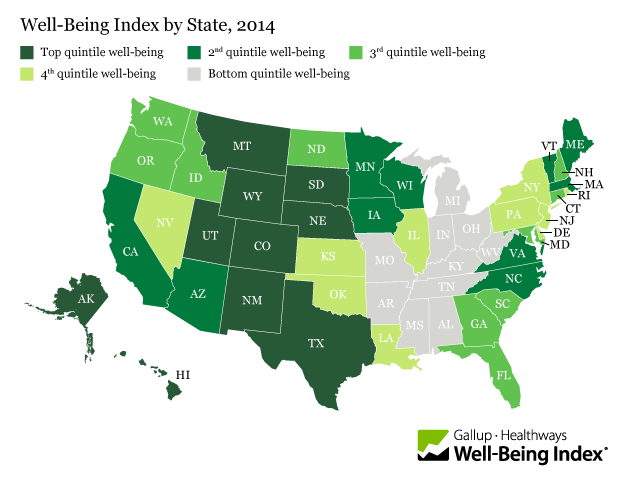
The Gallup-Healthways Well-Being Index: How Does Your State Stack Up?
For the past seven years, the Gallup-Healthways Well-Being Index, has been measuring and analyzing US states with the highest and lowest well-being. It’s a good reminder of the culture and type of lifestyle of a specific geographic location that contributes to its overall health.
The rate of uninsured Americans fell to a low of 12.9% in the fourth quarter of 2014.
Here at the Ornish Lifestyle Medicine program, it’s a window for us to think about the people in these places who could benefit from the four aspects of the Ornish Lifestyle Medicine – nutrition, love and support, stress management and fitness – to reverse disease, improve their lives, and eventually help contribute to their state moving up in the well-being ranks.
This year Alaska took the top spot for the first time, followed by Hawaii, South Dakota, Wyoming and Montana.Colorado and Hawaii were on the top ten list for the seventh consecutive year. West Virginia and Kentucky ranked 50th and 49th, respectively, for the sixth consecutive year.
Read more about the rankings here and download a copy here.
The report defined well-being based on set of lifestyle factors that include sense of purpose, social connection, and financial, community, and physical health. The data is gathered through 176,000 interviews with U.S. adults across all 50 states. Its goal is to offer a birds eye view of the progress and challenges that we face as a society. In the past, Gallup-Healthways studies have shown a correlation between well-being and health outcomes such as lower reliance on healthcare, workplace absenteeism and workplace performance, obesity, and well-being as a predictor of disease.
Alaska placed in the top spot for overall well-being as well as for having the highest ranking in sense of purpose. Hawaii took the top spot for financial and physical well-being, and South Dakota reported the strongest social and community well-being. West Virginia and Kentucky reported both the lowest physical and sense of purpose well-being. Healthways has plans to launch Ornish programs in both and West Virginia and Kentucky.
The report found that nationally many aspects of well-being improved in 2014 to their best levels since 2008. Most inspiring is that the rate of uninsured Americans fell to a low of 12.9% in the fourth quarter of 2014, indicating that millions of previously uninsured Americans now have insurance. In addition, life evaluation, a key outcome of well-being and a high-level measure of how people think about and evaluate their lives, reached its highest recorded point in the U.S. in 2014.
Even though the Affordable Care Act has succeeded to bring millions of Americans the healthcare coverage they deserve, obesity still reached its highest point in 2014. 27.7 percent of the nation moved into the obese category. This jump is yet another reminder of the improvements that need to happen in US lifestyle and eating habits as there is a direct correlation between obesity and some of the most common diseases that affect Americans.
“The most common chronic diseases—including high blood pressure, elevated cholesterol levels, and heart disease—have a common root cause: the lifestyle choices that we make each day,” says Dr. Ornish. “Most doctors prescribe a lifetime of medications to treat these conditions, but we showed that comprehensive lifestyle changes can prevent and even reverse these conditions, allowing physicians to often reduce or discontinue these medications.”
For more than 36 years, Dr. Ornish has directed a series of scientific research studies showing that the progression of even severe coronary heart disease – as well as other chronic conditions such as Type 2 diabetes and early-stage prostate cancer – can be slowed, stopped, and even reversed by making comprehensive lifestyle changes. Medicare is now covering the Ornish Program, which is the first time that Medicare has covered a program of comprehensive lifestyle changes.
The Ornish program includes four equally-weighted lifestyle pillars that have been proved to enhance an overall sense of well-being, and to even reverse chronic diseases, such as heart disease and diabetes. As Dr. Ornish likes to say, “We’ve found that when you make healthy choices, you feel better quickly, and feeling better is what makes them more sustainable. Also, when you make healthy choices within a loving, supportive community, you’re more likely to sustain those choices because they become more meaningful.”








